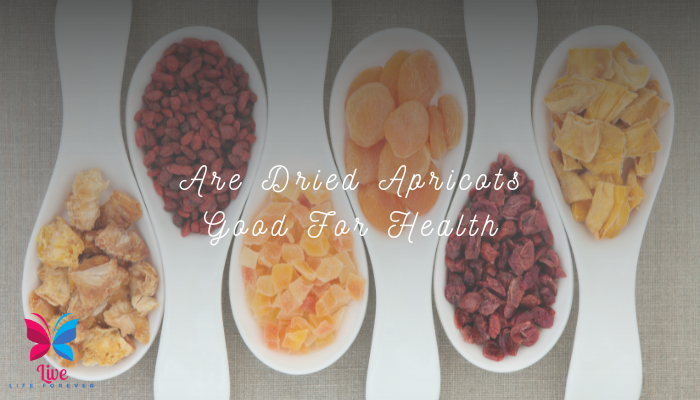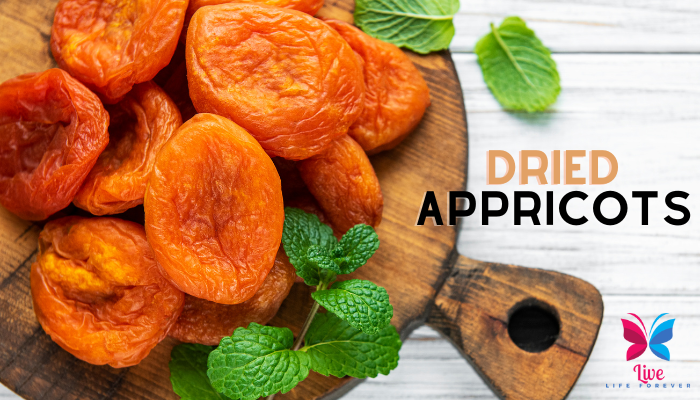Are Dried Apricots Good For Health: An Evidence-Based Analysis

Are Dried Apricots Good For Health: An Evidence-Based Analysis

Are Dried Apricots Good For Health
Eating dried fruit can be an excellent way to incorporate essential vitamins, minerals, fiber and antioxidants into your diet. Dried apricots in particular are packed with beneficial nutrients and have been associated with a variety of health benefits .
In this comprehensive guide, we analyze the nutritional value of dried apricots, their health effects and any potential downsides to consuming them.
Nutritional Profile of Dried Apricots
Dried apricots are high in many important vitamins, minerals, fiber and plant compounds. Just one serving provides a significant percentage of the recommended daily intake for some nutrients .
Vitamins and Minerals
Dried apricots are rich in provitamin A carotenoids, containing 1,126 micrograms per 100 grams. Consuming provitamin A carotenoids like beta-carotene may reduce the risk of certain types of cancer and prevent age-related decline in brain function .
Dried apricots also provide vitamin E, a powerful antioxidant that protects against free radical damage and inflammation in the body. One serving of dried apricots provides 4% of the daily recommended intake of this vitamin .
Additionally, dried apricots contain decent amounts of key minerals like iron, potassium and copper. Iron transports oxygen around the body, potassium controls heart rate and copper aids enzyme function .
Fiber
Dried apricots are one of the best fruit sources of fiber, with just 100 grams providing 7 grams — approximately 24% of the recommended daily value .
Fiber moves through the intestines undigested, promoting gut health by feeding healthy bacteria in the digestive tract .
Studies show that diets high in fiber from fruit are associated with health benefits like weight management, improved gut function and reduced risk of diabetes .
Antioxidants
Dried apricots contain various powerful antioxidants like carotenoids, vitamin E and polyphenols .
These compounds protect cells against damage from unstable molecules called free radicals. Too much free radical damage can accelerate aging and contribute to conditions like heart disease, cancer and vision loss .
Based on their exceptional antioxidant content, incorporating dried apricots into your diet can strengthen your body’s defenses against oxidative stress and inflammation.
8 Science-Based Health Benefits
With their stellar nutritional profile, it’s no wonder that eating dried apricots and other dried fruits is linked to a variety of health perks.
Here are 8 evidence-based health benefits of adding these sweet and chewy treats into your diet.
1. Reduce Heart Disease Risk
Heart disease is the world’s leading cause of death. Major risk factors include high blood pressure, elevated LDL cholesterol, smoking, obesity and physical inactivity .
Dried apricot consumption may improve several of these risk factors.
In one 12-week study, 35 adults at high risk of heart disease ate 7 dried apricot halves per day. They experienced significant reductions in LDL (“bad”) cholesterol and blood pressure, compared to a control group .
In another study, when adults with high cholesterol ate 5 prunes per day over 2 months, they experienced similar improvements in blood pressure, cholesterol and antioxidant status to those supplementing with 100 mg/day of antioxidant vitamins .
Though more research is needed, incorporating dried apricots into an overall healthy lifestyle may protect heart health.
2. Regulate Blood Sugar Levels
Eating fiber-rich dried apricots may improve glycemic control and insulin sensitivity, protecting against type 2 diabetes.
In one study of 50 adults with type 2 diabetes, eating 10 grams of prune powder along with meals for 3 months lowered HbA1c levels by 0.3%, on average .
HbA1c gives an estimate of blood sugar levels over the past 2–3 months . Even small decreases like this can reduce diabetes complications risk.
Another study found that when people supplemented withprune juice, blood sugar rose significantly less after a high carb meal compared to liquid and solid placebos .
Dried apricots have a similar nutrition profile to prunes, so they likely offer the same anti-diabetic effects. Still, more studies that specifically test dried apricots are needed.
3. Support Digestive Health
Gut issues like constipation, diverticulitis and inflammatory bowel disease (IBD) affect millions of people worldwide .
As a rich fiber source, dried apricots may relieve and prevent digestive issues.
In one study, 43 adults with constipation, diverticulitis or IBD ate 50 grams of dried plums (prunes) twice daily. After 3 weeks, symptoms improved in all participants. Laxative use also declined .
Another study found similar effects. Participants reported improved stool frequency and consistency during the prune supplement periods .
Overall, research demonstrates dried plums and prune juice increase stool frequency, improve consistency and ease passage through the intestines — effects also attributed to the laxative sorbitol .
Dried apricots contain around 3 grams of sorbitol per 100 grams, so they likely offer the same digestive relief . Still, more direct testing is needed.
4. Support Bone Health
Osteoporosis is characterized by weak, porous bones and low bone mineral density (BMD). This raises fracture risk .
Getting enough vitamin K benefits bone health, as it modifies proteins involved in bone metabolism. Just 100 grams of dried apricots provides 53 micrograms of vitamin K — up to 63% of the RDI .
Several observational studies link high vitamin K intakes to reduced fracture incidence and improved bone health.
Another analysis of two studies with over 78,000 women found that those consuming the most vitamin K had a 30% lower risk of hip fractures .
While research is mostly limited to observational studies on vitamin K status, increasing your intake of foods high in this nutrient — like dried apricots — supports bone health as part of a well-rounded diet.
5. May Have Anticancer Effects
The antioxidants in dried apricots may protect against cancer development and growth.
Test-tube studies demonstrate that apricot extract suppresses growth and induces apoptosis (programmed cell death) in liver, stomach, breast and larynx cancer cell lines .
However, human studies are needed.
Additionally, increased fiber intakes are tied to reduced colorectal cancer risk. For each 10-gram increase, risk declines 5–20%, on average .
As dried apricots provide 7 grams of fiber per 100-gram serving, incorporating them into your diet may protect against colorectal cancer. Still, more research is necessary.
6. Enhance Vision Health
Dried apricots are rich in antioxidants like vitamin A, vitamin E and carotenoids that are critical for maintaining healthy vision.
Vitamin A deficiencies are the world’s leading cause of preventable blindness .
Consuming provitamin A carotenoids like beta carotene from plant foods may reduce your risk of common eye diseases like macular degeneration and improve night vision .
Vitamin E also protects your eyesight by fighting free radicals that damage your eye’s lens, retina and macula .
Though research is limited, eating dried apricots regularly ensures you meet your daily nutrient needs to preserve vision function.
7. Improve Anemia Risk
Anemia, characterized by low red blood cell levels, often arises when your body lacks iron .
Dried apricots are a relatively rich plant source of iron, with 100 grams providing 20% of the RDI .
Increasing dietary iron intakes is the first line of treatment for anemia .
Studies demonstrate that boosting iron stores through diet and supplements relieves fatigue, improves exercise capacity, enhances brain function and more in those with low iron levels .
Therefore, eating iron-rich foods like dried apricots can reduce your risk of anemia, especially if combined with foods that enhance iron absorption, like those high in vitamin C.
8. Help Manage Weight
Fiber is linked to body weight regulation, as it increases feelings of fullness after meals and reduces hunger and calorie intake.
One review linked increased fiber intakes to reduced body weight and fat mass .
Another massive study associated each 10-gram increase in fiber with 3.7% reduced risk of weight and fat gain over nearly 6 years .
Specific types of fiber like pectin also modify gut hormones involved in appetite and slow the emptying of your stomach to curb hunger .
Given that dried apricots provide 7 grams of fiber per 100 grams, incorporating them into meals and snacks may aid appetite control and weight management efforts.
However, moderation is key, as dried fruit is calorie-dense and easy to overeat. Stick to a handful as a snack or small serving along with meals.

Safety, Preparation and Serving Tips
Dried apricots offer many benefits, but a few things should be considered when incorporating them into your diet.
Allergies and Intolerances
Dried apricots contain sulfites, which are added as preservatives to maintain color. Sulfites can trigger asthma attacks in sensitive people .
Additionally, dried apricots contain high amounts of sorbitol and other FODMAPs, carbohydrates that some people cannot digest properly .
Those with IBS or intolerances to these compounds may experience gas, bloating and other unwanted digestive symptoms from eating dried apricots.
Pesticide Residue Risks
The Environmental Working Group considers dried apricots a highly contaminated produce item .
Washing dried apricots before eating them and selecting certified organic varieties when possible minimizes pesticide exposure.
Natural Sugars and Calories
Keep in mind that dried apricots lose water during processing, so their nutrients are concentrated. This includes natural sugars.
Although dried apricots have a low to medium glycemic index (48 to 64 depending on variety), their sugars may affect blood sugar control .
Those with diabetes should monitor portions carefully and avoid overeating.
Also, the water loss concentrates calories, with just one cup (165 grams) providing over 400 calories. Monitor your portions if watching your calorie intake.
Preparation and Serving Tips
- Enjoy dried apricots on their own as a snack or added to homemade trail mixes. Keep pre-portioned baggies handy for grabbing on the go.
- Add chopped dried apricots to hot or overnight oats or cold cereal like muesli.
- Mix diced dried apricots into cookies, muffins, breads and scones. They make a nutritious substitute for chocolate chips or raisins.
- Make chutney or jam by cooking chopped dried apricots with apple cider vinegar, onions and desired seasonings.
- Create a unique salsa or relish using dried apricots, almonds, red onions and seasonings like cinnamon and coriander.
- Dice dried apricots and add them to salads, pilafs, stuffed vegetables like bell peppers or squash, meatballs or hamburgers.
- Purée dried apricots with orange juice and a pinch of cinnamon. Serve as a sauce over chicken, pork or fish dishes.
The Bottom Line Of Are Dried Apricots Good For Health
Dried apricots provide a quick, convenient way to get important nutrients like provitamin A, potassium and fiber into your diet.
Regularly eating them has been tied to health benefits ranging from improved heart health and digestion to better bone density and vision.
However, those with IBS, allergies or weight concerns should moderate portions and select high quality organic dried apricots whenever possible.
Overall, enjoying dried apricots in moderation can be an easy way to incorporate extra nutrition into meals and snacks.





I loved even more than you will get done right here. The overall look is nice, and the writing is stylish, but there’s something off about the way you write that makes me think that you should be careful what you say next. I will definitely be back again and again if you protect this hike.
Hey, cool post There is an issue with your website in Internet Explorer; could you please check this? Because of this issue, many people will overlook your excellent article because IE is still the most used browser.